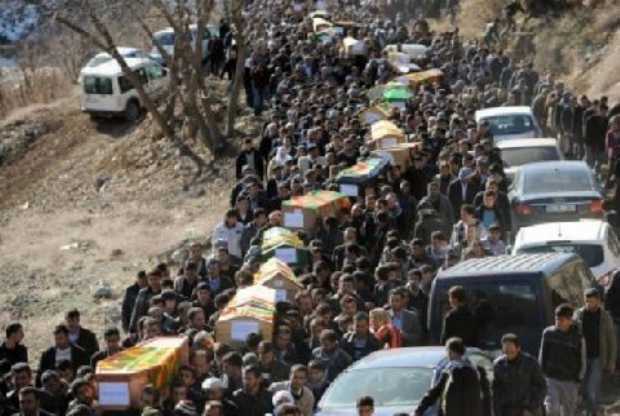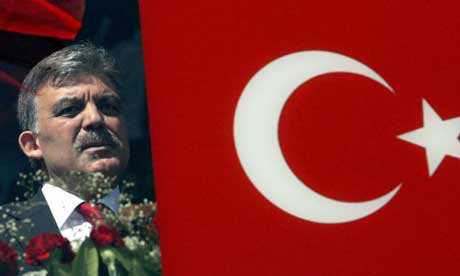Social media has been a boon for democratization forces around the world, most notably in the Middle East and North Africa. But a recent tragedy in Turkey helps highlights the fact that social media also has a potentially dark side for democratization efforts.

On the night of December 29, 2011, the Turkish military launched an airstrike along the Turkish-Iraqi border against what it believed to be militants belonging to the Kurdistan Workers’ Party, or PKK. In reality, military officers were targeting local villagers engaged in smuggling cigarettes. The case of mistaken identity left 35 individuals dead, many of them teenagers.
Social media played a crucial role in relaying news of the tragedy to the outside world, circumventing the military’s usual veil of secrecy. Within hours, local Kurds had posted graphic photos of the victims on Twitter; statements from family members followed soon afterwards. By comparison, mainstream Turkish media didn’t start providing coverage until hours later, after a press briefing from Army officers.
“[I]f Twitter did not exist, I am sure we would have heard about it, like two or three days later,” said political activist Cigdem Mater, referring to the tragic air strike. “And we would never know much about it.”
As elsewhere, social media is expanding Turkey’s information space. “We witness self-censorship and self-policing by television channels and also newspapers,” commented Yaman Akdeniz an associate professor of law at Istanbul’s Bilgi University and the founder of the online watchdog CyberLaw.org.uk. “This has resulted in society turning to other forms of news gathering from social media, and people have started to act as journalists themselves.”
Ironically, the lightning speed with which information made it out of Uludere — the site of the December attack, in one of Turkey’s most isolated, least developed areas — was made possible by the Turkish army itself. Government forces in the area rely heavily on mobile-phone communications, a legacy of the army’s decades-long campaign to contain the PKK’s insurgency.
While there is no question that Twitter, Facebook and other social networking platforms are opening up Turkish society in general, all the information sharing may be driving people apart, specifically Kurds from Turks. Twitter is making possible for the circulation of far more details than ever before about clashes between Turkish security forces and PKK militants, usually within hours of the incidents. Social media is also spreading personal details about those killed in armed confrontations. Such information is fanning passions on both sides, but it is especially disillusioning for Kurdish youths, said Ertuğrul Kürkçü, an MP for the pro-Kurdish Peace and Democracy Party.
“[Young Kurds] are losing any faith in living together with Turks,” Kürkçü said. They perceive a lack of respect “from both the government and society,” a mix that contributes to an enmity even deeper than “that of the former generations,” he alleged.
In such a polarizing atmosphere, the manipulation of news or the distribution of false reports on social media is becoming a growing concern. “I think there is a danger of Twitter being used to provoke people,” warned political activist Mater, “For example just two weeks after Uludere, there was a Tweet saying there was a massive operation by the Turkish army against the PKK, and the news spread through Twitter, everyone was talking about it. But checking through our Kurdish sources it turned out not to be true.”
“There is a strong danger of provoking people through Twitter because no one knows if the news is true or not,” Mater added. “Of course, Twitter is important, but it does have risks.”
Turkey could turn out to be an important proving ground for identifying the limitations of social media, and developing ways to address them. The country is among the region’s frontrunners in developing mobile telephony and Turks now rank among the world’s top users of social media — eighth for Twitter (4 million users) and fourth for Facebook usage (nearly 30 million subscribers), according to comScore Inc., a company that specializes in digital analytics.
Ferocious competition among Turkey’s three privately owned mobile phone operators, which offer subscribers cheap smart phones, plays a role in encouraging social media usage. Nearly a quarter of the country’s 65.3 million mobile phone users own a smart phone, the fourth-highest rate in Central and Eastern Europe, the European Travel Commission reports. In addition, half of Turkey’s population of 74.7 million is under the age of 29, a demographic mix that suggests social media usage will maintain strong growth.
Social media seems especially important for Kurdish youth. Akdeniz, the Bilgi University law professor, worries that social media will become a casualty in the government’s 30-year campaign against the PKK. “Polarization is going to be a huge problem in social media, and it will be difficult to address,” he said. “I fear the next level by the government will involve prosecution. …Then perhaps people might start getting worried about using these micro- blogging sites or social media platforms.”
Officials are already on record as being concerned about the use of the Internet to spread what they see as terrorist propaganda. Officials have tightened the parameters of free speech on the web, and thousands of websites are already blocked in Turkey under court orders. Individuals have also been prosecuted for posting comments on the Web that are deemed hate speech, especially comments on religious matters.
It’s not clear whether existing laws and regulation apply to social media platforms, such as Twitter.
via Turkey: Twitter Cuts Two Ways | EurasiaNet.org.


